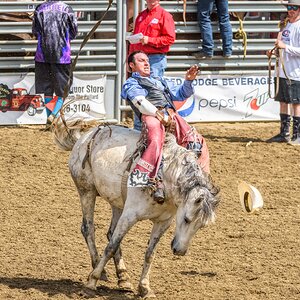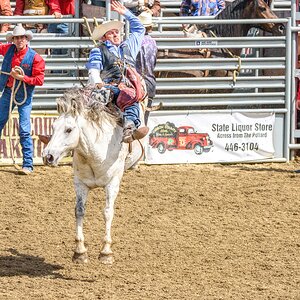rufus5150
TPF Noob!
- Joined
- Mar 8, 2008
- Messages
- 1,658
- Reaction score
- 2
- Location
- Austin, Texas
- Website
- www.toddmckimmey.com
- Can others edit my Photos
- Photos NOT OK to edit
To OneSister (from the OP):
Art is funny like that.
The single most important is to recognize the audience of your critique. If someone hands you a blurry picture that is a center-framed snapshot with blown out highlights, obviously, they're struggling. They need it phrased in a way they can understand it. They're not looking for an dissertation on all of their flaws, regardless of what they outright ask for (aforementioned 'am I ready to be pro' example is apropos here), they need to be guided on the ropes.
This leads to another important facet which is the ability to communicate everything above. A critique is meant to be read. If someone comes to me with a critique that I can barely discern the sentence structure, it's not going to help me much. If you begin to condescend, you've lost your reader and their work, however high or low quality, and you've wasted time with the critique. (Yes, we should all forgive spelling on the internet, though!)
The art of the critique is a dialog between the piece presented and its reaction, the author of the piece and the author of the critique. The goal of a critique is to further understand the piece and to further understand the piece in relation to other works. The critique seeks to discover the intent from the realized and to highlight how that was accomplished and how it fell short.
If you would like the best definition of a critique ever put on film, watch the end of Ratatouille where Anton Ego gives his critique of Gusteau's. Ignore for the moment it's a cartoon, and listen to what the script writer came up with. It's the most concise, telling thing I've heard on 'critique' in the last 10 years. It is really, in isolation, a beautiful piece of prose.
I shall therefore mention only in passing that I think the means you used to express your disdain ("children", "must have trouble navigating the world", etc) was truly a poor choice of attack when you'd made your point very clear earlier without name calling. The tone certainly prevented me from, in my limited sensibilities, replying any sooner than now.
To alpha:
Not all photos (and I've seen a few here) have even 1 good quality. So make the critique short and simple. Focus on one key flaw, maybe two, and tell them, briefly, how it might be remedied. You might view a photo as a complete failure, but, if you're feeling constructive, you might try to nudge them a bit in the right direction and help them understand that they're on a path to 'doing things right'.
Also understand that many 'new' people, regardless of what they post, are readily unfamiliar with anything but a 'snapshot'. They're here to make those better. Maybe they can be inspired past that. I know that 8 months ago, I'd no idea what 'macro photography' was. I bought a DSLR and was horribly upset at the fact that I spent $1000 for a camera that didn't also record video (long story and lots of disposable income and an eager salesman). But if it weren't for a few people (elsewhere, not here) who took a look at my feeble attempts at snapshots and said 'this is what you might like to read, this is what you might look up on the internet, etc' that I decided to take full advantage of what this new camera might offer.
To The_Traveller:
I'd like to wrap this up neatly but I've already rambled on long enough. I think there is probably a nice middle ground between the 'atta boys', the attention whores, and the lofty Capital-A-for-Art people that these forums are closer to than anyone would like to admit. But as I'm new, I'll wait it out and see, and maybe I'll get an 'atta boy' when I most need it, and maybe I'll get a 'this is how you should improve' when I need it most. They both have their place.
In rare situations, this can be quite useful, especially when someone posts a series of images. I know what you're referring to, but when someone says I like #8, it does at least direct the poster to say to themselves 'what is it about this photo that strikes people?'One type can be cranky, is always shooting from the hip, no holds barred, knee jerk, I like it or I hate it.
I disagree. When you're dealing with many amateurs and hobbyists like this website is, encouragement can be a good device. Is it overused here sometimes with people being overly 'polite'? Yes, I would concur there.it does not help the OP in any way
Or perhaps it is just being nice. That in and of itself should never be a bad thing.perhaps it makes them feel better about their own work or even themselves
I do see this on occasion here, but it is limited to a few posters who post regularly. I see many new accounts (*checks post count* er, like I'm at all old, heh!) who seem to want the awe or aww on their first post. I did find it amusing as I went looking for other forums, the first post I cam across was a series of snapshots of someone horribly posed, with the question 'do I have what it takes to be pro?' (the repliers, btw, were less than kind). I don't think that the 'situation' -- if there is indeed one -- here is all that different from any other mostly free site.Sometimes the OP will be so sure of an images value and quality that it is posted not for critique but for the roar of the crowd, the one in their own head.
You can get objective critique only insofar as technical issues are concerned. People can sometimes objectively relate any piece of art to a style, historical artworks, movements, etc, but an image which may drive thousands may not move someone who is viewing your picture on here. I've seen some technically brilliant photos here that do not so much as move me, and some that are technically all over the map, and not in a good way, that somehow draw me in to the story they're telling. So who do we throw out there? The person who has flubbed every technical detail imaginable but has yet managed to create something that inspires, or someone who has every technical facet down and, for all intents and purposes has created a masterful image that fails to move that particular viewer?I want the objective critique one might receive if they were in a classroom situation.
Art is funny like that.
On to the crux. The 'art' of a good critique, in and of itself, is first to not only explain the 'what' but the 'why'. Obviously, the technical issues can be fairly low-hanging fruit in this regard, but not always. Second, remember high school English and the dreaded 'Compare and Contrast'? This is where that comes in. If the work moves, look for the why in other pictures, other types of art. Look for how it appeals to the senses other than the visual. Can the smoke trail above the cigarette invoke the smell of burning tobacco to you?I am asking those educators, those knowledgeable photographers, how to give a good critique.
The single most important is to recognize the audience of your critique. If someone hands you a blurry picture that is a center-framed snapshot with blown out highlights, obviously, they're struggling. They need it phrased in a way they can understand it. They're not looking for an dissertation on all of their flaws, regardless of what they outright ask for (aforementioned 'am I ready to be pro' example is apropos here), they need to be guided on the ropes.
This leads to another important facet which is the ability to communicate everything above. A critique is meant to be read. If someone comes to me with a critique that I can barely discern the sentence structure, it's not going to help me much. If you begin to condescend, you've lost your reader and their work, however high or low quality, and you've wasted time with the critique. (Yes, we should all forgive spelling on the internet, though!)
The art of the critique is a dialog between the piece presented and its reaction, the author of the piece and the author of the critique. The goal of a critique is to further understand the piece and to further understand the piece in relation to other works. The critique seeks to discover the intent from the realized and to highlight how that was accomplished and how it fell short.
If you would like the best definition of a critique ever put on film, watch the end of Ratatouille where Anton Ego gives his critique of Gusteau's. Ignore for the moment it's a cartoon, and listen to what the script writer came up with. It's the most concise, telling thing I've heard on 'critique' in the last 10 years. It is really, in isolation, a beautiful piece of prose.
I shall therefore mention only in passing that I think the means you used to express your disdain ("children", "must have trouble navigating the world", etc) was truly a poor choice of attack when you'd made your point very clear earlier without name calling. The tone certainly prevented me from, in my limited sensibilities, replying any sooner than now.
To alpha:
If you consider for a moment that, when someone comes here, what they see in general when feedback is requested, they may very well be posting for exactly that reason. It is only a more lofty position from which a statement like that can be made, and that, unfortunately, helps very few individuals who find themselves here.If people are posting images for critique in order to get a pat on the back, then they're posting for the wrong reason.
My advice would be to try for the biggest fish... in that particular image or in photography in general (or maybe that class of photograph) what is the first key element that must be present? Framing? Composition? Focus? With those not far along, you don't have to blast their entire photo, but zero in on one or two problems. "The focus in this is off which detracts from any statement being made. If you zero in and really nail the focus on the person in the foreground, you'd be on your way to a much better photo." If you need to throw in something nice, try and find one thing about the photo that you can appreciate -- are there no blown highlights? Are the tones good in a certain area?I often look at images posted for critique here and see a laundry list of problems, from poor exposure to unoriginal composition, poor attention to light and other environmental factors, and terrible post-processing. So it's often really very difficult to give an "encouraging" critique when there are so many wrong things that also need to be noted.
Not all photos (and I've seen a few here) have even 1 good quality. So make the critique short and simple. Focus on one key flaw, maybe two, and tell them, briefly, how it might be remedied. You might view a photo as a complete failure, but, if you're feeling constructive, you might try to nudge them a bit in the right direction and help them understand that they're on a path to 'doing things right'.
The neat thing about the internet is the rapid pace of its feedback. And to a neophyte who may even have trouble making sense of their camera manual, this may be their practice. You cannot fault them for that.If you study and you practice, and then you've got some real questions
Also understand that many 'new' people, regardless of what they post, are readily unfamiliar with anything but a 'snapshot'. They're here to make those better. Maybe they can be inspired past that. I know that 8 months ago, I'd no idea what 'macro photography' was. I bought a DSLR and was horribly upset at the fact that I spent $1000 for a camera that didn't also record video (long story and lots of disposable income and an eager salesman). But if it weren't for a few people (elsewhere, not here) who took a look at my feeble attempts at snapshots and said 'this is what you might like to read, this is what you might look up on the internet, etc' that I decided to take full advantage of what this new camera might offer.
To The_Traveller:
I've had, in the past few days, a good set of opportunities to use the 'search' function of these forums. I consider myself good at using such tools because, well, I've authored many similar ones before for databases, bulletin boards, data warehouses, etc. Frankly, if someone's new to these forums, the search feature can be a little... less than productive. And the older a forum gets, the more redundant questions are going to be asked. Let someone else handle them if they're becoming old hat or keep a list of links handy or... if you're feeling altruistic, write a good FAQ starting point for the, for lack of a better phrase, 'frequently asked questions'.Count the new posts and see what percentage are complete, redundant questions.
Here's a point the 'we are the critiquers' can really do a service -- identify these 'snaps' and don't just say 'that's a snapshot', 'that looks snapshottish' because early posters don't know what that means. And, now having ready many idiot's guides and dummy books as well as some more learned material, none of them defined what a 'snapshot' was compared to what an 'actual picture' is!Count the new posts and see how many are actual pictures rather than snaps.
I'd like to wrap this up neatly but I've already rambled on long enough. I think there is probably a nice middle ground between the 'atta boys', the attention whores, and the lofty Capital-A-for-Art people that these forums are closer to than anyone would like to admit. But as I'm new, I'll wait it out and see, and maybe I'll get an 'atta boy' when I most need it, and maybe I'll get a 'this is how you should improve' when I need it most. They both have their place.


![[No title]](/data/xfmg/thumbnail/37/37170-3e18af574ed51cce5bdf99af9d3cab40.jpg?1619737908)


![[No title]](/data/xfmg/thumbnail/40/40310-01bec1b9b7918522bf21a09cf75c5266.jpg?1619739414)

![[No title]](/data/xfmg/thumbnail/37/37519-6093821531f744039f3ac2b3e30c7dbf.jpg?1619738128)



![[No title]](/data/xfmg/thumbnail/35/35932-28690c4fc247cf491230e47fc70ebeb5.jpg?1619737235)
![[No title]](/data/xfmg/thumbnail/42/42482-3d0e794a92737ca7ecbc8125874457aa.jpg?1619740195)
![[No title]](/data/xfmg/thumbnail/37/37518-fb05b52482bd05e84fb73316ba1a9c8f.jpg?1619738128)